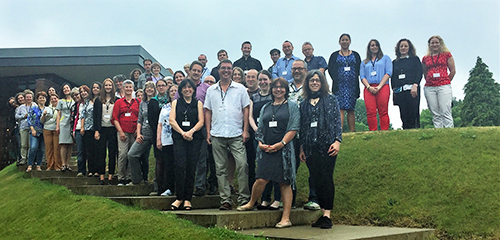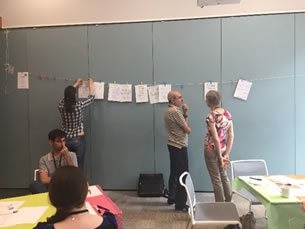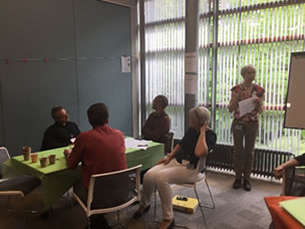
EPPO Workshop on Flexible Scope
Wageningen (NL), 2017-06-26/28
The EPPO Workshop on flexible scope was organized with the Dutch National Reference Centre of the NPPO on 2017-06-26/28 at NVWA, Geertjesweg 15, Wageningen (NL). The Workshop followed in the series of Workshops on Quality Assurance and Accreditation. It was attended by 46 participants from 24 countries. Participants included Laboratory managers, Quality Managers, and representatives from Accreditation bodies.

Workshop participants – more pictures ![]()
Background on flexible scope
Historically, the accreditation of laboratories has usually been based on a fixed scope which should define clearly and unambiguously the range of tests covered by the laboratory’s accreditation (e.g. immunofluorescence test for the detection of Ralstonia solanacearum on potato tubers). However, this does not readily allow new or modified tests to be added to a laboratory’s scope, even when the competence of the laboratory in performing and validating related tests has already been evaluated by an accreditation body. Although applications for an extension to scope can be made at any time, the timescales involved may actually prevent quick reactions to client’s demands. Consequently, the concept of flexible scope has been developed. A flexible scope of accreditation allows a laboratory to undertake certain tests, and to report the results as accredited, even though these tests are not explicitly stated in the laboratory’s scope.
The aim of the Workshop was exchange experiences from laboratories with flexible scope to improve harmonization of approaches in the EPPO region. It was considered that such harmonization was urgently needed because requirements for laboratories to be accredited for all their activities in plant pest diagnostic are increasing. The initial output expected from the Workshop was to identify the main components that should be included in an EPPO Standard on Flexible scope. However, during the Workshop, it appeared that revision of the two existing Standards on Quality Assurance, PM 7/84 Basic requirements for quality management in plant pest diagnosis laboratories and PM 7/98 Specific requirements for laboratories preparing accreditation for a plant pest diagnostic activity was a better approach (see below).
Organisation of the Workshop
The Workshop started with a plenary session including presentations of laboratories’ experience with flexible scope. The following presentations were made:
- Introduction to the Workshop (EPPO)
- Key note 1: Mr Sitaras (European Association for Accreditation)
- Key note 2: Experience at the National Reference Center (NL) Ms Edema
- Key note 3: Experience in Fera (GB) Ms Weekes
- Experience in Anses (FR) Ms Wilson
- Experience in Sasa (GB) Ms Ross
- Experience in NIB (SI) Ms Dreo
- Experience in ILVO (BE) Mr de Jonghe
- Experience in EVIRA (FI) Ms Santala
- Experience in LWK Niedersachsen, Pflanzenschutzamt (DE) Mr Pastrick
Three small workshops organized in parallel followed the plenary session to discuss practical issues on validation, quality assurance and expertise as part of the diagnostic process in the framework of flexible scope. All participants attended each of the three workshops.
- Validation in the framework of flexible scope.
- Quality Assurance in the framework of flexible scope.
- Expertise as part of the diagnostic process in the framework of flexible scope.
Outputs of the practical Workshops included:
- A review of internal and external quality checks and the section Ensuring the quality of diagnosis (in PM 7/84).
- Examples of expertise and competence and how these can be evaluated.
- A review of the management system of a laboratory.
- Agreement on the inclusion of the concept of risk analysis in the validation process described in PM 7/98 and factors to consider in this.
- A review of the requirements linked to the participation in proficiency tests.
- The proposal of the inclusion of a flow diagram in PM 7/98 to describe the extension of the scope.
- A review of Appendix 6 in PM 7/98 on Validation of Morphological and Morphometrical methods used in e.g. Entomology, Nematology, Mycology, Botany.
Different techniques were used in the workshops (world café, poster editing method) and the Workshop leaders encouraged participation of the whole group.




Follow-up after the practical workshops
A separate meeting of a small drafting group composed of experts from the Panel on Diagnostics and Quality Assurance followed. Revisions of PM 7/84 and PM 7/98 were prepared by the drafting group and the revised Standards will be sent for country consultation after the summer. It was considered that the changes to the EPPO Standards should be made quickly in particular due to the new European Plant Health Regulation. It is noted that a revision of the ISO 17025 Standard is underway but as the new version has not been seen the EPPO Panels cannot yet take this into consideration. This may require another revision of the EPPO Standard. The participants considered that the workshop had been useful and concluded that if another workshop on quality assurance is organised this should include content on the risk analysis process.
The EPPO Secretariat would like to thank our hosts in particular Ms Edema (NPPO, NL) Mr Werkman (NPPO, NL) for their excellent assistance in the preparation and running of the Workshop. We are also very grateful to Ms Anthoine (ANSES, FR), Ms Roenhorst (NPPO, NL) and Ms Weekes (Fera Science Limited, GB) their enthusiasm and knowledge which was so valuable for running the 3 sessions of each practical workshop. The drafting group are warmly thanked for their unwavering support.
